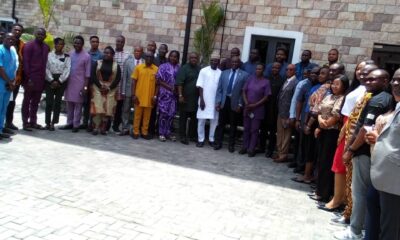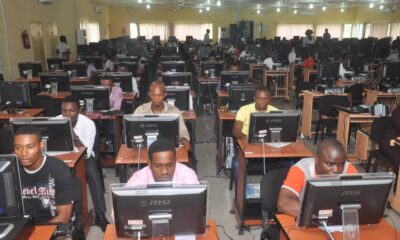News
Iran Bombing Kills 5 Revolutionary Guard Leaders
A suicide bomber killed five senior commanders of the powerful Revolutionary Guard and at least 37 others yesterday near the Pakistani border in the heartland of a potentially escalating Sunni insurgency.
The attack, which also left dozens wounded, was the most high-profile strike against security forces in an outlaw region of armed tribal groups, drug smugglers and Sunni rebels known as Jundallah, or Soldiers of God.
President Mahmoud Ahmadinejad promised sharp retaliation. But a sweeping offensive by authorities is unlikely.
Iranian officials have been reluctant to open full-scale military operations in the southeastern border zone, fearing it could become a hotspot for sectarian violence with the potential to draw in al-Qaida and Sunni militants from nearby Pakistan and Afghanistan.
The region’s top prosecutor, Mohammad Marzieh, was quoted by the semi-official ISNA news agency as saying Jundallah claimed responsibility for the blast in the Pishin district near the Pakistani border.
There was no immediate statement directly from the group, which has carried out sporadic kidnappings and attacks in recent years — including targeting the Revolutionary Guard — to press their claims of persecution in the Shiite government and officials.
In May, Jundallah said it sent a suicide bomber into a Shiite mosque in the southeastern city of Zahedan, killing 25 worshippers.
The latest attack, however, would mark the group’s highest-level target. It also raised questions about how the attacker breached security around such a top delegation from the Revolutionary Guard — the country’s strongest military force, which is directly linked to the ruling clerics under Supreme Leader Ayatollah Ali Khamenei.
The official Islamic Republic News Agency said the victims included the deputy commander of the Guard’s ground forces, Gen. Noor Ali Shooshtari, as well as a chief provincial Guard commander, Rajab Ali Mohammadzadeh. The others killed were Guard members or tribal leaders, it said.
The agency quoted the provincial forensics director, Abbas Amian, as saying 42 bodies had been handed over to his department.
More than two dozen others were wounded, state radio reported.
The commanders were entering a sports complex to meet tribal leaders to discuss Sunni-Shiite cooperation when the attacker detonated a belt fitted with explosives, IRNA said.
Ahmadinejad — who counts on support from the Revolutionary Guard — vowed to strike back.
“The criminals will soon get the response for their inhuman crimes,” IRNA quoted him as saying.
But controlling the scrubland and arid hills along the southeastern borders is a huge challenge that has been out of Iran’s reach.
Drug traffickers ferry opium and other narcotics through the cross-border badlands — a key source of income for the Taliban in Afghanistan and the ethnic Baluchi tribes that straddle the three-nation region and include members of Jundallah. Iran has pleaded for more international help to cut off the drug routes and criminal gangs.
Iran also has accused Jundallah of receiving support from al-Qaida and the Taliban, though some analysts who have studied the group dispute such a link.
“There is no evidence of outside help for Jundallah from wider militant networks,” said Mustafa Alani, director of security and terrorism studies at the Gulf Research Center in Dubai. “It’s a homegrown group that moves across the borders within fellow Baluchi tribes. It is very hard to control the border.”
In an attempt to boost security in the region, Iran in April put the Revolutionary Guard directly in control of the Sistan-Baluchistan Province in Iran’s southeastern corner.
The 120,000-strong Guard also controls Iran’s missile program, guards its nuclear facilities and has its own ground, naval and air units.
The Revolutionary Guard led the blanket crackdown on dissident after Ahmadinejad’s disputed re-election in June. But the attack Sunday appeared to have no link to the political showdowns.
State television accused Britain of supporting Jundallah, without providing any evidence.
The Revolutionary Guard blamed the attack on what it called the “global arrogance,” a reference to the United States.
On the eve of talks about Tehran’s nuclear program, Washington was quick to react.
State Department spokesman Ian Kelly said the United States condemned what he called an “act of terrorism.” Reports of alleged U.S. involvement are “completely false,” he said.
Iran’s parliamentary speaker, Ali Larijani, told lawmakers that the bombing was aimed at further destabilizing the uneasy border region with Pakistan and Afghanistan.
“The intention of the terrorists was definitely to disrupt security in Sistan-Baluchistan Province,” Larijani said.
Iranian officials summoned Pakistan’s charge d’affairs in Tehran to lodge allegations that “terrorists” use bases in Pakistan to carry out attacks against Iran, IRNA reported.
In Quetta, Pakistan, police official Akbar Sanjrani said Iran had closed at least one border crossing. He said Iranian authorities did not give a reason for blocking the route, but Sanjrani speculated it was related to the bombing.
Pakistan’s Foreign Office spokesman, Abdul Basit, also rejected Iranian claims that Jundallah’s leader is in Pakistan.
“We are struggling to eradicate the menace of terrorism,” Basit told Geo TV.
The group also has claimed responsibility for a February 2007 car bombing that killed 11 members of the Revolutionary Guard near Zahedan.
Despite Iran’s claims of an al-Qaida link, Chris Zambelis, a Washington-based risk management consultant who has studied Jundallah, said in a recent article that there is no evidence al-Qaida is supporting the group. He does note, however, that the group has begun to use the kinds of suicide bombings associated with the global terror network.
“Jundallah’s contacts with the Taliban are most likely based on jointly profiting from the illicit trade and smuggling as opposed to ideology,” Zambelis wrote in the July issue of West Point’s CTC Sentinel.
News
Rivers @ 58: Stakeholders Task Govt On Infrastructure, Human Dev

As Rivers State celebrates the 58th anniversary of its creation today, some stakeholders have called on the State Government to do more towards improving the quality of infrastructure and human capital development in the State..
A cross section of stakeholders who spoke in an interview with The Tide also commended successive administrations in the state for their efforts towards expanding infrastructure network across the state.
They noted that more communities, both at the upland and riverine parts of the State, now have access to road network than when the stayte was created 58 years ago.
They, however, urged the government to return the state to the era of overseas scholarship when brilliant students are given opportunities to further their studies.
Speaking with The Tide, former youth leader of Chokota community in Etche Local Government Area, Mr. Ebere Nwankwo, said Rivers State has made progress in various fronts, despite the ongoing political crisis in the State.
Nwankwo noted that the State now has more tertiary institutions, both private and public, while the number of secondary schools have tripled.
He added that the State has also recorded tremendous progress in the area of healthcare.
According to him, healthcare has been brought closer to the doorstep of the common man, as there is hardly any local government in the state that doesn’t have a government health centre today.
The youth leader further said that many Rivers indigenes, home and abroad, have brought glory to the State in their various capacities, and urged the government to provide the enabling environment for the youths to excel.
Also speaking, the spokesperson for the International Peace Advocates, Mr. Emmanuel Nkweke, said the position of Rivers State among the comity of states in the country cannot be taken for granted.
He attributed this success to the efforts of successive administrations in repositioning the state for development.
Nkweke, however, called for a speedy resolution of the political impasse in the State to enable the State move to the next level of development.
Also speaking, a civil servant, Mrs. Ngozi Sunday, noted the efforts of government to improve the quality of lives of Rivers people, but called for a return to democratic governance in the State.
Another civil servant, Mrs. Munuonye Tina Ogechi, said Rivers State within the past 58 years has recorded significant achievements in road infrastructure, youth empowerment and repositioning of the state civil service for greater productivity.
She commended the suspended Governor of the State, Sir Similanayi Fubara, for taking the issue of women empowerment and peace seriously.
Meanwhile, a teacher, Mr. Orie Fiberesima, decried the high cost of living and lack of jobs in the State, and the need for a more effective government.
He also stressed the need for the government to look into the issue of high rent in Port Harcourt, noting that houses are now beyond the reach of the average Rivers man.
Mr. Innocent Chimobi, in his own view, urged the government to attract more industries and foreign investments to the State as a way of providing employment opportunities for the jobless youths in the State.
He also called the attention of the government to the terrible state of roads in some rural communities, advising the government to work hand in hand with the communities to foster better development.
By: John Bibor/Claire Julius
News
Minister Sets Up Team To Manage Emefiele-Linked Estate

The Minister of Housing and Urban Development, Ahmed Dangiwa, yesterday, unveiled a 12-member ministerial committee to oversee the 753-unit recovered housing estate linked to former Central Bank of Nigeria Governor, Godwin Emefiele.
The estate was recently handed over to the Ministry by the Economic and Financial Crimes Commission, following a directive from President Bola Ahmed Tinubu.
In a statement released yesterday, Dangiwa emphasised the critical nature of the assignment, describing it as a key step towards realising the housing component of the Renewed Hope Agenda.
The statement read, “Housing and Urban Development Minister, Ahmed Dangiwa, has inaugurated a twelve-member ministerial committee on the 753-unit recovered housing estate located in the Lokogoma district, Abuja, FCT.”
He reiterated that the committee’s mandate aligns with the President’s vision and the Ministry’s reform objectives to transform the estate into liveable, secure, and affordable homes for Nigerians.
“The committee was constituted based on the vision of Mr President and the Ministry’s housing reform drive to ensure that the recovered property is swiftly transformed into liveable, secure, and affordable homes for the benefit of Nigerians,” he said.
Dangiwa underscored the importance of technical expertise and institutional integrity in executing the assignment, noting that committee members were selected from key departments within the Ministry.
“Your selection is a testament to the confidence the Ministry has in your ability to drive this initiative with the seriousness and efficiency it demands.
“Nigerians are watching and expect results. They want to see homes completed and allocated transparently. They want to see the government working for them,” Dangiwa emphasised, urging committee members to collaborate effectively and remove unnecessary bottlenecks.
He charged them to adopt a fresh mindset, stating, “Think outside the box. Be results-oriented.”
The committee is chaired by the Ministry’s Permanent Secretary, Shuaib Belgore, and includes senior directors and aides from the technical, financial, engineering, planning, procurement, and media departments.
The committee’s Terms of Reference include conducting a thorough structural and integrity assessment of the buildings, determining the number and condition of housing units, and valuing existing work through proper surveying and market evaluation.
Additionally, the committee will assess costs required to complete essential infrastructure such as roads, power, and water. It will also develop standards for architectural and finishing consistency, propose a fair and transparent strategy for disposal and allocation of units via the Renewed Hope Housing Portal, and devise a public engagement plan to build confidence.
The committee must ensure effective coordination with key stakeholders, including the EFCC, FCTA, and relevant utility providers. A preliminary report is expected within four weeks.
The Minister of State, Yusuf Ata, emphasised the need for the committee to co-opt additional professionals as required, given the scale of the task and tight deadline.
“The committee should have the authority to co-opt members to assist, considering the magnitude of the task and the four-week timeline,” he noted.
Belgore assured that the team would execute its duties diligently and professionally.
“The committee has been tasked with ensuring the recovered estate undergoes a comprehensive technical assessment, is strategically completed, and disposed of transparently and cost-effectively, in line with national housing delivery objectives,” he said.
He added that the success of the assignment would serve as a model for transforming recovered public assets into impactful infrastructure.
“The successful execution of this assignment will serve as a benchmark for converting recovered public assets into infrastructure that directly benefits the people,” he concluded.
News
Hajj 2025: Saudi Arabia Deports Gumi

Renowned Islamic scholar, Sheikh Ahmad Gumi, has been deported from Saudi Arabia after being denied entry into Medina, effectively barring him from participating in the 2025 Hajj pilgrimage.
Gumi, a Kaduna-based cleric, known for his controversial views on national and international issues, confirmed the development in a statement posted on his official Facebook page, yesterday.
“Due to some reasons related to my views on world politics, the authorities in Saudi Arabia do not want me to be present at Hajj even though they have granted me a visa,” Gumi wrote.
The cleric, who was part of a delegation of religious scholars sponsored by the National Hajj Commission of Nigeria (NAHCON), arrived at Prince Mohammad Bin Abdulaziz International Airport in Medina on Saturday night via Umza Air.
However, upon arrival, Saudi immigration officials reportedly stopped him at the airport and denied him entry into the city, before placing him on a return flight to Nigeria.
Sheikh Gumi added in a statement on his page that the Nigerian authorities have shown concern and have promised to engage Saudi officials to seek clarification and resolution.
“I am grateful to the authorities in Nigeria who have pledged to engage with the Saudi authorities on this matter,” he said.
Although no official reason has been provided by Saudi Arabia for the deportation, observers believe the action may be connected to Sheikh Gumi’s outspoken political and religious views, which may be at variance with the kingdom’s policies.
Gumi has, in recent years, played a prominent role in dialogue initiatives with armed groups in Nigeria’s northern region and has often voiced criticism of Western and Middle Eastern political interventions.
The incident has sparked discussions among religious communities and the wider public, with many questioning the implications of political ideology on religious observance.
As of the time of filing this report, there is no official statement from the Saudi embassy or the Nigeria’s Ministry of Foreign Affairs on the development.
Sheikh Gumi has since resumed his public preaching and teaching engagements in the country.
-

 Oil & Energy2 days ago
Oil & Energy2 days agoNigeria Loses More Crude Oil Than Some OPEC Members – Nwoko
-

 Niger Delta2 days ago
Niger Delta2 days agoHYPREP Solicits Regulators, Asset Owners’ Support
-
Rivers2 days ago
Oil Spills: Association Slams SPDC Over Non-Inclusion Of More Communities
-

 News3 days ago
News3 days agoRSG Announces Phased Rehabilitation Of State Secretariat
-
Niger Delta2 days ago
Oborevwori Upgrades Delta NYSC Camp …Prioritises People-Oriented Governance
-

 Business2 days ago
Business2 days agoFG Begins Move Towards Steel Sector Revival
-

 Features2 days ago
Features2 days agoNDDC@25: Making a Difference Through Foreign Scholarship Scheme
-
Rivers2 days ago
Okeke Calls For Presidential Run-Off Election …Faults Primary School Certificate For Presidency

